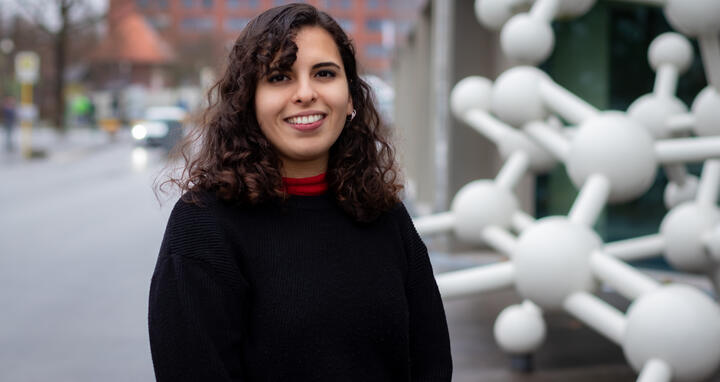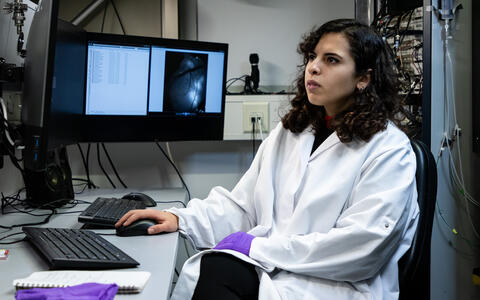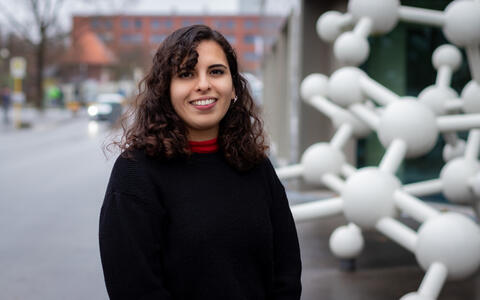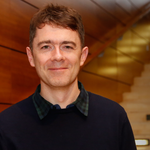iNAMES promotes German-Israeli exchange
Our PhD students benefit from an international network of outstanding researchers. They have access to several thesis mentors in both Berlin and Rehovot.
In August 2022, when Gamze Güney was looking to use a new research method for her PhD at the Max Delbrück Center, she traveled to Rehovot in Israel to spend five weeks working in Professor Ofer Yizhar’s lab at the Weizmann Institute of Science (WIS). Yizhar is an expert in optogenetics, a biological method that allows scientists to control cells with light. Güney, a neuroscientist who hails from Turkey, is based in Professor James Poulet’s lab at the Max Delbrück Center, where she researchers how mice brains process and then perceive different temperatures on the skin. By combining behavioral experiments with two-photon optogenetics, she can now examine individual neurons under the microscope to gain a better understanding of their role in temperature perception. The temperatures she uses are neither too hot nor too cold, so the mice are not in any pain.
Interdisciplinary projects with Israel
Two years ago, Güney became one of the first PhD students to enroll in “iNAMES – MDC-Weizmann Helmholtz International Research School (HIRS) for Imaging and Data Science from the NAno to the MESo,” which was founded by the Max Delbrück Center, Charité – Universitätsmedizin Berlin, Humboldt-Universität zu Berlin, and WIS. Since 2020, the school has been attracting more and more PhD students, who each work in one of the Berlin labs that are participating in interdisciplinary research projects with Israel.
So far, the iNAMES Research School has enrolled eleven doctoral students from a wide variety of disciplines. Nine of them are working in six labs at the Max Delbrück Center, and two are at Charité. iNAMES will be accepting up to eight more candidates in 2023. Coordinator Dr. Sanja Drakulij says: “Our PhD students benefit from an international network of outstanding researchers. They have access to many thesis mentors in both Berlin and Rehovot.”
The first iNAMES symposium
Working in Berlin, Güney learned how important it is to network and to talk about your project with researchers, even if they work in completely different fields. At the iNAMES symposium, which was held in November at the Berlin Institute for Medical Systems Biology in the Max Delbrück Center (MDC-BIMSB), all the iNAMES students gave a seven-minute presentation of a research problem they had encountered in their PhD work – using hand-drawn sketches. These “chalk talks” were intended to be both informative and entertaining. Their audience wasn’t just made up of neuroscientists, but also immunologists, cancer researchers, and biophysicists. Güney says the presentation helped her explain her research better: “I often get too technical, so outsiders don’t understand what I’m talking about.
The two-day iNAMES symposium took place for the first time this year. Güney and her fellow PhD candidates helped prepare and run the event. And they weren’t the only ones to take to the stage: 22 renowned speakers from each of the partner institutions gave insights into the latest advancements in biomedical imaging, image analysis, and data science technologies.
Many benefits for iNAMES students
The iNAMES program fully finances the students’ PhDs. In addition to their salary, the students also receive financial support for training, conferences, and travel to the partner labs in Israel. The PhD Coordinator at the Max Delbrück Center regularly asks the students what they need support with – and takes their requests into account when organizing training. This has resulted in courses in statistics and workshops for stress management, intercultural communication, gender justice, and communication skills. The program also includes special seminars, lecture series, summer schools, and a PhD retreat.
It’s nice to be part of a group.
The young researchers meet once a month to discuss their individual plans and help each other tackle the major and minor questions that every PhD student faces sooner or later: How do I move forward with my thesis? How can I motivate myself to keep going? What problems can we solve, and how? “It’s nice to be part of a group,” says Güney, who came to study in Germany seven years ago. She points out that, unlike bachelor’s and master’s students, PhD students aren’t automatically part of a community. At iNAMES, though, they definitely are.
Text: Christina Anders








